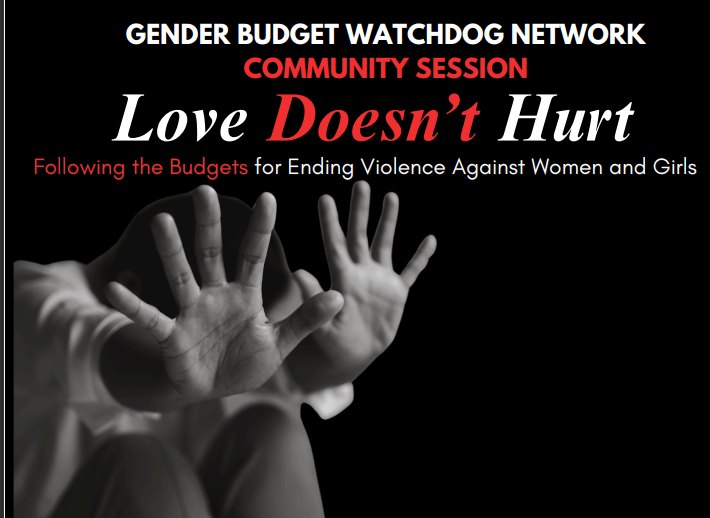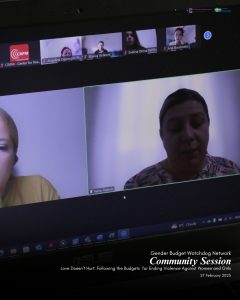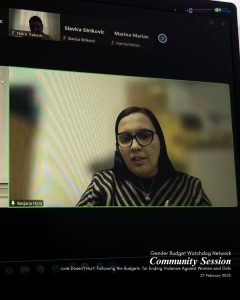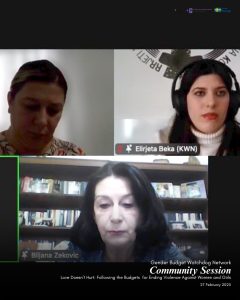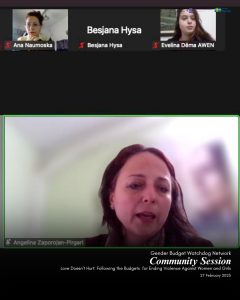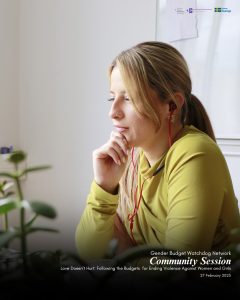🗓️ Date: 27.02.2025 | 🕒 Time: 14:00-16:00
🎤 Speakers: Adelina Berisha, Biljana Zekovic,Neira Rakovic, Angelina Zaporojan Pirgari, Ana Naumoska.
The Gender Budget Watchdog Network recently convened a high-level session titled “Love Doesn’t Hurt: Following the Budgets for Ending Violence Against Women and Girls,” bringing together leading experts, civil society representatives, and stakeholders from across the Western Balkans to critically examine the systemic challenges in addressing gender-based violence (GBV).
This session provided an in-depth analysis of the persistent gaps in institutional capacity, funding, education, and political commitment that undermine efforts to prevent and respond to GBV in the region. It highlighted the urgent need for targeted budget allocations and comprehensive policy reforms to enhance the effectiveness and sustainability of GBV services.
Key Challenges in Addressing Gender-Based Violence
Participants identified several critical obstacles impeding the delivery of adequate GBV services:
-
Insufficient Institutional Capacity: Many institutions lack the necessary resources, training, and personnel to provide effective support to survivors.
-
Inadequate Financial Analysis and Funding: Absence of thorough cost analysis for GBV-related services results in underfunding. Service providers, including shelters and helplines, often rely on insufficient government funding or voluntary labor, which is unsustainable and leads to service gaps.
-
Limited Public Education: The absence of comprehensive educational programs hampers societal efforts to prevent GBV and address harmful norms.
-
Bureaucratic and Political Barriers: Complex administrative procedures delay critical support services, while a lack of political will and opposition to GBV initiatives undermine progress.
Funding and Coordination Challenges
The session underscored that funding for GBV services remains inadequate and fragmented across the region. In Bosnia and Herzegovina, for example, the decentralization of financial responsibilities across multiple ministries complicates coherent budget planning and allocation. Many organizations remain heavily dependent on donor funding, which is increasingly uncertain.
Speakers emphasized the need for robust mechanisms to track the allocation and utilization of GBV-related funds, advocating for transparency and anti-corruption measures to ensure resources effectively reach intended beneficiaries.
Strategic Recommendations
The session concluded with actionable recommendations to strengthen GBV prevention and response frameworks:
-
Ensure Sustainable and Dedicated Funding: Governments must establish clear, dedicated budget lines for GBV services at all administrative levels.
-
Enhance Financial Transparency: Implement mechanisms for systematic tracking and auditing of funds allocated to GBV-related programs.
-
Expand Public Education Initiatives: Integrate GBV awareness and gender equality into formal education and public awareness campaigns.
-
Foster Regional and Institutional Collaboration: Improve coordination among governmental agencies, civil society, and international partners to streamline efforts and share best practices.
-
Promote Political Commitment: Advocate for strengthened political will to prioritize GBV on national and regional agendas, including legislative and policy reforms.
Conclusion
The “Love Doesn’t Hurt” session reaffirmed the indispensable role of civil society in combating gender-based violence while emphasizing that sustained governmental support is critical to achieving lasting impact. Enhanced funding, transparency, education, and political will are essential to effectively protect women and girls and uphold their rights.
📄 A detailed report of the webinar is also available here: https://gbwn.net/wp-content/uploads/2025/07/GBWN-Webinar-Report-Following-the-Budgets-for-GBV.pdf-1-1.pdf
▶️ The full webinar recording is available on YouTube via the following link:

